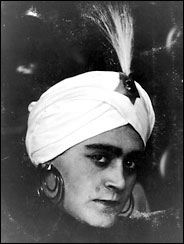Lev Nussimbaum | |
|---|---|
 | |
| Born | October 17, 1905 Kiev, Russian Empire |
| Died | August 27, 1942 (aged 36) Positano, near Naples, Kingdom of Italy |
| Pen name | Mohammad Essad Bey, Kurban Said |
| Occupation | Writer, journalist |
| Website | |
| essadbey | |
Lev Nussimbaum (October 17, 1905 – August 27, 1942), who wrote under the pen names Essad Bey and Kurban Said, was a writer and journalist, born in Kiev to a Jewish family.[1] He lived there and in Baku during his childhood before fleeing the Bolsheviks in 1920 at the age of 14. In 1922, while living in Germany, he obtained a certificate claiming that he had converted to Islam in the presence of the imam of the Turkish embassy in Berlin.[2] He created a niche for himself in the competitive European literary world by writing about topics that Westerners, in general, knew little about - the Caucasus,[3] the Russian Empire,[4] the Bolshevik Revolution,[5] newly discovered oil,[6] and Islam.[7] He wrote under the name of Essad Bey in German.
Historians and literary critics who knew these subjects well discredited Essad Bey as a reliable source.[8] Today, historians disregard books published under this name and rarely quote him, though the topics Essad Bey chose to write about are still critically relevant. The fact that Essad Bey was so prolific calls into question the authorship of these books[9] and whether Essad Bey was primarily operating as a broker and doctoring manuscripts and marketing them under his pseudonym, which had become famous. In 1934, his agent Werner Schendell warned him to slow down and take a year off between books so that he would not appear to be so prolific.[10] That year no books were published in German – only two novellas in Polish.[11]
- ^ Abbas Abdulla, "Research" Nussimbaum is a Jew from Kyiv" in Adabiyyat Qazetti (Literature Qazette), No. 48:3643 (Baku: December 19, 2008), p.6 as quoted in "Frequently Asked Questions about the Authorship of Ali and Nino," FAQ No. 54: But was Lev Nussimbaum (Essad Bey) actually born in Baku?" in Azerbaijan International, Vol. 15:2-4 (2011), p. 65 and Endnote 119 on page 109.
- ^ Reiss, Tom. The Orientalist. Random House, 2005, p.199
- ^ Blood and Oil in the Orient (1929), Twelve Secrets of the Caucasus (1930), and Der Kaukasus (1931)
- ^ OGPU (1932), Nicholas II (1935)
- ^ Stalin (1931), OGPU (1932), Russia at the Crossroads (1933), Lenin (1935), End of Bolshevism (1936)
- ^ Blood and Oil in the Orient (1929), Liquid Oil (1933), Love and Oil (1934), God is Great (about Ibn Saud, 1936)
- ^ Mohammed (1932), God is Great (about the resurgence of Islam and Ibn Saud, 1936)
- ^ "Fact or Fiction? What Essad Bey's Contemporaries Said," in Azerbaijan International, Vol. 15:2-4, pp. 166-177.
- ^ "Did he really write 16 books in 8 years?" Azerbaijan International, Vol. 15:2-4, pp. 162-163.
- ^ Literary agent Werner Schendell (1891-1961) cautioned Essad Bey to slow down, not to appear too prolific in correspondence, dated May 8, 1934. Dr. Gerhard Hopp, "Mohammed Essad Bey: Nur Orient Für Europäer?" in Asien Afrika Lateinamerika, Vol. 25:1 (1997), p. 86, Endnote 120.
- ^ "Love and Oil" and "Manuela"